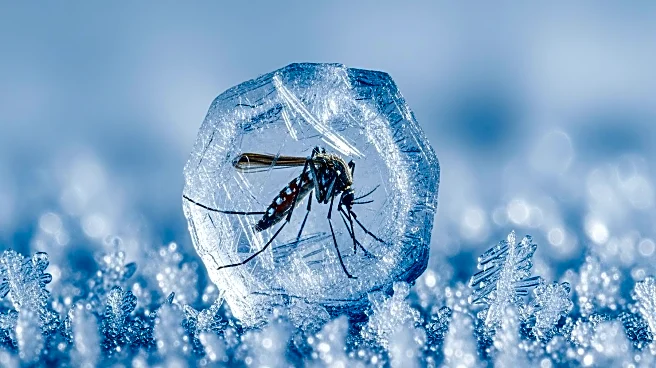What's Happening?
Scientists in Iceland have confirmed the discovery of mosquitoes in the wild for the first time, marking a significant development given the country's traditionally inhospitable climate for these insects. The mosquitoes were identified as belonging to the Culiseta
annulata species, which is known to thrive in colder climates. This discovery was made by Björn Hjaltason in Kiđafell, Kjós, and later verified by entomologist Matthías Alfreðsson from the Natural Science Institute of Iceland. The presence of mosquitoes in Iceland, a country previously free from these insects due to its cold climate, has sparked discussions about the potential impact of climate change on mosquito habitats. While some experts, including Colin J. Carlson from Yale University, caution against directly attributing this discovery to climate change, the warming temperatures in Iceland could enhance the potential for other mosquito species to establish themselves in the region.
Why It's Important?
The discovery of mosquitoes in Iceland is significant as it highlights the potential effects of climate change on the distribution of vector-borne diseases. Mosquitoes are known carriers of diseases such as malaria and dengue, and their presence in new regions could pose public health challenges. As global temperatures rise, the habitats suitable for mosquitoes expand, potentially increasing the risk of disease transmission in areas previously unaffected. This development underscores the need for increased monitoring and research to understand the implications of climate change on mosquito populations and the associated health risks. The situation in Iceland serves as a reminder of the broader environmental changes occurring worldwide and the importance of addressing climate change to mitigate its impact on ecosystems and human health.
What's Next?
Further monitoring is planned to determine whether the Culiseta annulata species can survive the Icelandic winter and establish a permanent presence. This will involve tracking the mosquitoes' ability to endure the cold and assessing their potential impact on local ecosystems. The findings could influence future research and policy decisions regarding climate change adaptation strategies and public health preparedness. Scientists and policymakers may need to consider measures to prevent the spread of mosquito-borne diseases in regions newly exposed to these insects. Additionally, the discovery may prompt further studies into the effects of climate change on insect populations and the potential for new disease vectors to emerge in other parts of the world.
Beyond the Headlines
The presence of mosquitoes in Iceland raises ethical and environmental questions about the impact of human-induced climate change on natural habitats. It highlights the interconnectedness of global ecosystems and the unintended consequences of environmental shifts. The situation may lead to discussions about the responsibility of nations to address climate change and protect vulnerable regions from its effects. Furthermore, it could prompt a reevaluation of conservation strategies to preserve biodiversity and prevent the spread of invasive species. The discovery serves as a case study for understanding the broader implications of climate change on wildlife and the need for international cooperation in addressing environmental challenges.
















